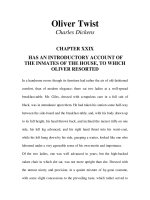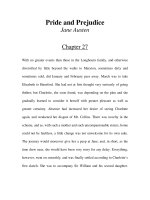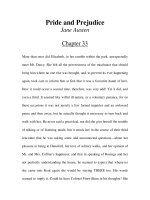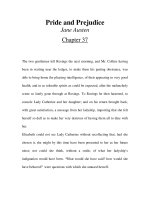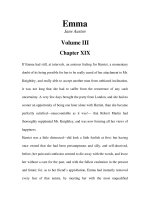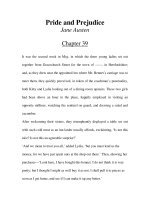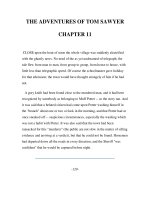Tài liệu LUYỆN ĐỌC TIẾNG ANH QUA TÁC PHẨM VĂN HỌC-SHORT STORY BY O’HENRY -A Call Loan docx
Bạn đang xem bản rút gọn của tài liệu. Xem và tải ngay bản đầy đủ của tài liệu tại đây (23.74 KB, 9 trang )
SHORT STORY BY O’HENRY
A Call Loan
In those days the cattlemen were the anointed. They were the grandees of the
grass, kings of the kine, lords of the lea, barons of beef and bone. They
might have ridden in golden chariots had their tastes so inclined. The
cattleman was caught in a stampede of dollars. It seemed to him that he had
more money than was decent. But when he had bought a watch with
precious stones set in the case so large that they hurt his ribs, and a
California saddle with silver nails and Angora skin suaderos, and ordered
everybody up to the bar for whisky--what else was there for him to spend
money for?
Not so circumscribed in expedient for the reduction of surplus wealth were
those lairds of the lariat who had womenfolk to their name. In the breast of
the rib-sprung sex the genius of purse lightening may slumber through years
of inopportunity, but never, my brothers, does it become extinct.
So, out of the chaparral came Long Bill Longley from the Bar Circle Branch
on the Frio--a wife-driven man--to taste the urban joys of success.
Something like half a million dollars he had, with an income steadily
increasing.
Long Bill was a graduate of the camp and trail. Luck and thrift, a cool head,
and a telescopic eye for mavericks had raised him from cowboy to be a
cowman. Then came the boom in cattle, and Fortune, stepping gingerly
among the cactus thorns, came and emptied her cornucopia at the doorstep
of the ranch.
In the little frontier city of Chaparosa, Longley built a costly residence. Here
he became a captive, bound to the chariot of social existence. He was
doomed to become a leading citizen. He struggled for a time like a mustang
in his first corral, and then he hung up his quirt and spurs. Time hung
heavily on his hands. He organised the First National Bank of Chaparosa,
and was elected its president.
One day a dyspeptic man, wearing double-magnifying glasses, inserted an
official-looking card between the bars of the cashier's window of the First
National Bank. Five minutes later the bank force was dancing at the beck
and call of a national bank examiner.
This examiner, Mr. J. Edgar Todd, proved to be a thorough one.
At the end of it all the examiner put on his hat, and called the president, Mr.
William R. Longley, into the private office.
"Well, how do you find things?" asked Longley, in his slow, deep tones.
"Any brands in the round-up you didn't like the looks of?"
"The bank checks up all right, Mr. Longley," said Todd; "and I find your
loans in very good shape--with one exception. You are carrying one very
bad bit of paper--one that is so bad that I have been thinking that you surely
do not realise the serious position it places you in. I refer to a call loan of
$10,000 made to Thomas Merwin. Not only is the amount in excess of the
maximum sum the bank can loan any individual legally, but it is absolutely
without endorsement or security. Thus you have doubly violated the national
banking laws, and have laid yourself open to criminal prosecution by the
Government. A report of the matter to the Comptroller of the Currency--
which I am bound to make--would, I am sure, result in the matter being
turned over to the Department of Justice for action. You see what a serious
thing it is."
Bill Longley was leaning his lengthy, slowly moving frame back in his
swivel chair. His hands were clasped behind his head, and he turned a little
to look the examiner in the face. The examiner was surprised to see a smile
creep about the rugged mouth of the banker, and a kindly twinkle in his
light-blue eyes. If he saw the seriousness of the affair, it did not show in his
countenance.
"Of course, you don't know Tom Merwin," said Longley, almost genially.
"Yes, I know about that loan. It hasn't any security except Tom Merwin's
word. Somehow, I've always found that when a man's word is good it's the
best security there is. Oh, yes, I know the Government doesn't think so. I
guess I'll see Tom about that note."
Mr. Todd's dyspepsia seemed to grow suddenly worse. He looked at the
chaparral banker through his double-magnifying glasses in amazement.
"You see," said Longley, easily explaining the thing away, "Tom heard of
2000 head of two-year-olds down near Rocky Ford on the Rio Grande that
could be had for $8 a head. I reckon 'twas one of old Leandro Garcia's outfits
that he had smuggled over, and he wanted to make a quick turn on 'em.
Those cattle are worth $15 on the hoof in Kansas City. Tom knew it and I
knew it. He had $6,000, and I let him have the $10,000 to make the deal
with. His brother Ed took 'em on to market three weeks ago. He ought to be
back 'most any day now with the money. When he comes Tom'll pay that
note."
The bank examiner was shocked. It was, perhaps, his duty to step out to the
telegraph office and wire the situation to the Comptroller. But he did not. He
talked pointedly and effectively to Longley for three minutes. He succeeded
in making the banker understand that he stood upon the border of a
catastrophe. And then he offered a tiny loophole of escape.
"I am going to Hilldale's to-night," he told Longley, "to examine a bank
there. I will pass through Chaparosa on my way back. At twelve o'clock to-
morrow I shall call at this bank. If this loan has been cleared out of the way
by that time it will not be mentioned in my report. If not--I will have to do
my duty."
With that the examiner bowed and departed.
The President of the First National lounged in his chair half an hour longer,
and then he lit a mild cigar, and went over to Tom Merwin's house. Merwin,
a ranchman in brown duck, with a contemplative eye, sat with his feet upon
a table, plaiting a rawhide quirt.
"Tom," said Longley, leaning against the table, "you heard anything from Ed
yet?"
"Not yet," said Merwin, continuing his plaiting. "I guess Ed'll be along back
now in a few days."
"There was a bank examiner," said Longley, "nosing around our place to-
day, and he bucked a sight about that note of yours. You know I know it's all
right, but the thing is against the banking laws. I was pretty sure you'd have
paid it off before the bank was examined again, but the son-of-a-gun slipped
in on us, Tom. Now, I'm short of cash myself just now, or I'd let you have
the money to take it up with. I've got till twelve o'clock to-morrow, and then
I've got to show the cash in place of that note or--"
"Or what, Bill?" asked Merwin, as Longley hesitated.
"Well, I suppose it means be jumped on with both of Uncle Sam's feet."
"I'll try to raise the money for you on time," said Merwin, interested in his
plaiting.
"All right, Tom," concluded Longley, as he turned toward the door; "I knew
you would if you could."
Merwin threw down his whip and went to the only other bank in town, a
private one, run by Cooper & Craig.

